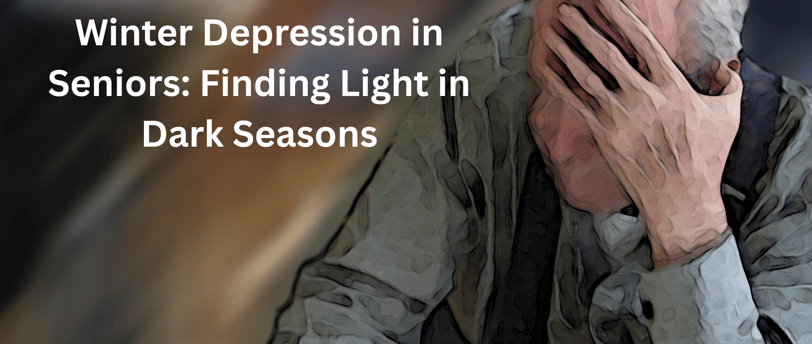Winter Depression in Seniors: Finding Light in Dark Seasons


Winter Depression in Seniors: Finding Light in Dark Seasons
"Then Jesus again spoke to them, saying, 'I am the Light of the world; he who follows Me will not walk in darkness, but will have the Light of life.'" — John 8:12 (NASB)
When the Texas winter settles in—even our relatively mild version—many seniors notice a familiar visitor returning uninvited: the blues. Days grow shorter, skies turn gray, and that vibrant energy from spring and summer seems to drain away like water from a leaky bucket. What you might dismiss as "just feeling down" could actually be Seasonal Affective Disorder (SAD) or winter depression, a very real condition that affects millions of older adults.
Mystic and theologian A.W. Tozer once observed, "God is looking for people through whom He can do the impossible." For Texas seniors struggling with winter depression, this truth offers hope in the darkness. When natural light fails and emotional shadows lengthen, God specializes in bringing supernatural light to the darkest seasons of our lives.
Understanding Winter Depression in Seniors
Winter depression goes beyond occasional sadness about shorter days or gray skies. It represents a pattern of mood changes that correlate with reduced sunlight and can significantly impact daily functioning, especially in seniors who may already face other challenges.
The Science Behind Seasonal Blues: Reduced sunlight exposure affects your brain's production of serotonin (a mood-regulating chemical) while increasing melatonin (which makes you sleepy). For seniors, whose neurochemistry may already be affected by medications or health conditions, these changes can be particularly pronounced.
Texas-Specific Factors: While Texas winters are milder than northern states, the shift from long, bright summer days to shorter winter periods can still trigger seasonal mood changes. Additionally, Texas seniors may spend more time indoors during winter months, further reducing light exposure.
Senior-Specific Vulnerabilities: Older adults face unique risk factors for winter depression including decreased mobility limiting outdoor time, health conditions requiring indoor confinement, medication side effects that affect mood, and social isolation that worsens during colder months.
Beyond "Just Feeling Down": Winter depression symptoms include persistent sadness or hopelessness, loss of interest in previously enjoyed activities, increased sleeping or difficulty staying awake, carbohydrate cravings and weight gain, decreased energy and motivation, and difficulty concentrating or making decisions.
Spiritual Light in Seasonal Darkness
Christ's declaration in John 8:12 speaks directly to those walking through dark seasons—literally and figuratively. When natural light diminishes and depression clouds your perspective, Jesus offers supernatural light that doesn't depend on weather patterns or daylight hours.
Light That Doesn't Fade: Unlike sunlight that varies with seasons, Christ's light remains constant. Your mood may fluctuate with winter weather, but God's love, presence, and promises don't dim during dark months.
Walking in Light Despite Darkness: Jesus promises that those who follow Him "will not walk in darkness." This doesn't mean you won't experience dark seasons, but that you don't have to navigate them alone or without hope.
The Light of Life: Christ offers more than temporary mood improvement—He provides "the Light of life" that brings purpose, meaning, and hope even when circumstances feel overwhelming.
God's Impossible Work: Tozer's insight about God doing the impossible becomes personal when you realize that finding joy in dark seasons, maintaining hope during depression, and experiencing peace amid emotional storms are all impossible by human standards—yet possible through divine intervention.
Practical Strategies for Combating Winter Depression
Maximize Natural Light Exposure: Even during Texas winters, make an effort to spend time outdoors during the brightest part of the day. Open curtains and blinds to let maximum light into your home. Consider rearranging living spaces to take advantage of natural light from windows.
Consider Light Therapy: Light therapy boxes that mimic natural sunlight can be effective for treating seasonal depression. Consult with your doctor about whether light therapy might benefit you and what type of device would be most appropriate.
Maintain Social Connections: Winter isolation worsens depression symptoms. Make intentional efforts to stay connected with family, friends, and church community. Consider joining indoor activities at senior centers, libraries, or community organizations.
Establish Winter Routines: Structure provides stability during emotionally challenging seasons. Maintain regular sleep schedules, meal times, and daily activities even when motivation is low.
Focus on Spiritual Disciplines: Winter can be an ideal time for deeper prayer life, Bible study, and spiritual reflection. When outdoor activities are limited, use the time for spiritual growth and communion with God.
Texas-Specific Winter Light Solutions
Take Advantage of Mild Days: Texas winters often include beautiful, warm days perfect for outdoor activities. When the temperature rises and sun shines, make the most of these natural mood boosters.
Explore Indoor Texas Attractions: Museums, botanical gardens with greenhouse spaces, shopping centers, and community centers provide opportunities for social interaction and bright environments during gray days.
Plan Strategic Travel: If finances allow, consider visiting friends or family in sunnier locations during the darkest winter months. Even a week in a brighter climate can help reset your mood.
Utilize Covered Outdoor Spaces: Many Texas homes and community centers have covered patios or screened porches that allow you to enjoy fresh air and natural light even during cooler weather.
When to Seek Professional Help
Persistent Symptoms: If winter blues persist for more than two weeks or significantly interfere with daily activities, relationships, or self-care, consider consulting a healthcare provider.
Medication Interactions: Some medications can worsen seasonal depression. Discuss your winter mood changes with your doctor to explore potential adjustments or alternatives.
Suicidal Thoughts: Any thoughts of self-harm or suicide require immediate professional attention. Contact your doctor, a mental health crisis line, or emergency services immediately.
Christian Counseling: Faith-based counselors can help you address winter depression while incorporating biblical principles and spiritual resources into treatment.
Community and Family Support
Educate Loved Ones: Help family members understand that winter depression is a medical condition, not a character flaw or spiritual weakness. Their support and patience can be crucial for recovery.
Create Accountability: Ask trusted friends or family members to check on you regularly during winter months and help you maintain healthy routines when motivation is low.
Church Support: Many churches have visitation ministries, small groups, or senior programs that provide regular social contact and spiritual encouragement during difficult seasons.
Volunteer Opportunities: Serving others can provide purpose and social connection while combating the inward focus that depression often creates.
Biblical Hope for Dark Seasons
God's Faithfulness in All Seasons: Psalm 74:16-17 reminds us that God made both summer and winter, light and darkness. He remains faithful and present regardless of seasonal changes or mood fluctuations.
Joy in the Morning: Psalm 30:5 promises that "weeping may last for the night, but a shout of joy comes in the morning." Winter depression feels overwhelming, but it's temporary—spring will come again, both literally and emotionally.
Strength for Today: Isaiah 40:29 assures us that God "gives strength to the weary and increases the power of the weak." When winter depression saps your energy, God provides supernatural strength for each day's needs.
Light in Darkness: Isaiah 9:2 declares that "the people who walk in darkness will see a great light." Even in the depths of seasonal depression, God's light can penetrate the darkness.
Tozer's Impossible Made Possible
A.W. Tozer's observation about God doing the impossible becomes profoundly personal when applied to winter depression. Finding joy when everything feels gray, maintaining hope when energy is depleted, and experiencing God's presence when emotions feel numb—these seem impossible from human perspective.
Yet God specializes in the impossible. He can bring light to your darkest winter days, hope to your most despairing moments, and strength to your weakest hours. The same God who commands the sun to rise each morning can bring the light of His presence to illuminate your winter blues.
Your seasonal struggle doesn't disqualify you from being a vessel through whom God does impossible things. In fact, it may be precisely through your experience with winter depression that God demonstrates His sustaining grace to other seniors facing similar challenges.
Christ's promise in John 8:12 stands as certain today as when He first spoke it: those who follow Him will not walk in darkness. Winter may come with its shortened days and gray skies, but you don't have to walk through dark seasons alone or without the Light of life.
When natural light fails, supernatural Light prevails. When seasonal darkness settles, eternal Light shines. The impossible becomes possible when the Light of the world illuminates even the darkest winter of the soul.
